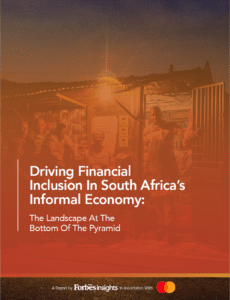As sub-Saharan Africa’s second-biggest economy, South Africa is a booming business hub with a thriving informal economy that cannot be ignored.
The country’s micro-enterprises and informal businesses are a crucial part of the National Development Plan for economic transformation, job creation, and poverty reduction, and are an attractive under-penetrated market for financial services.
This 20-page white paper, titled Driving Financial Inclusion In South Africa’s Informal Economy: The Landscape At The Bottom Of The Pyramid, published by FORBES AFRICA Insights, in association with Mastercard, captures the challenges and opportunities of the informal sector and the transformative power of financial inclusion in this segment that will thereby further economic growth that benefits everyone.
The recent report investigated underserved consumers (LSM 4-7) and Small Medium and Micro Enterprises (SMMEs) in the informal sector across South Africa’s three provinces and business hubs – Gauteng, KwaZulu-Natal and the Western Cape – to establish factors that would democratize and widen financial access and enable equitable financial inclusion.
The report documents the state of financial inclusion in South Africa, thereby exploring potential solutions or alternatives to cash as a preferred form of payment within the informal market sector.
Loading...
How can the main actors at the bottom of the income pyramid be incentivized for digitizing their commercial exchanges – and eventually switch from cash – so they can be included, and empowered, in a formal financial ecosystem?
The report was brought out through quantitative surveys, data analysis, stakeholder interviews and desktop research.
Over 500 face-to-face quantitative interviews were conducted with excluded consumers – consumers who primarily use cash when making or receiving payments, or have bank accounts that are inactive, or have access to facilities such as credit and digital banking but choose not to make use of them; over 200 quantitative interviews were conducted with informal sector SMMEs; and over a dozen qualitative interviews were conducted with senior executives in the country’s financial services sector.
The interesting findings and insights include why cash still reigns, why there is now a shift in sentiment being recorded and the many opportunities for accelerating contactless and digital payment solutions in the country’s township economies.
FORBES AFRICA Insights is the strategic research and thought leadership practice of FORBES AFRICA. This report was produced in partnership with Mastercard.
Loading...

